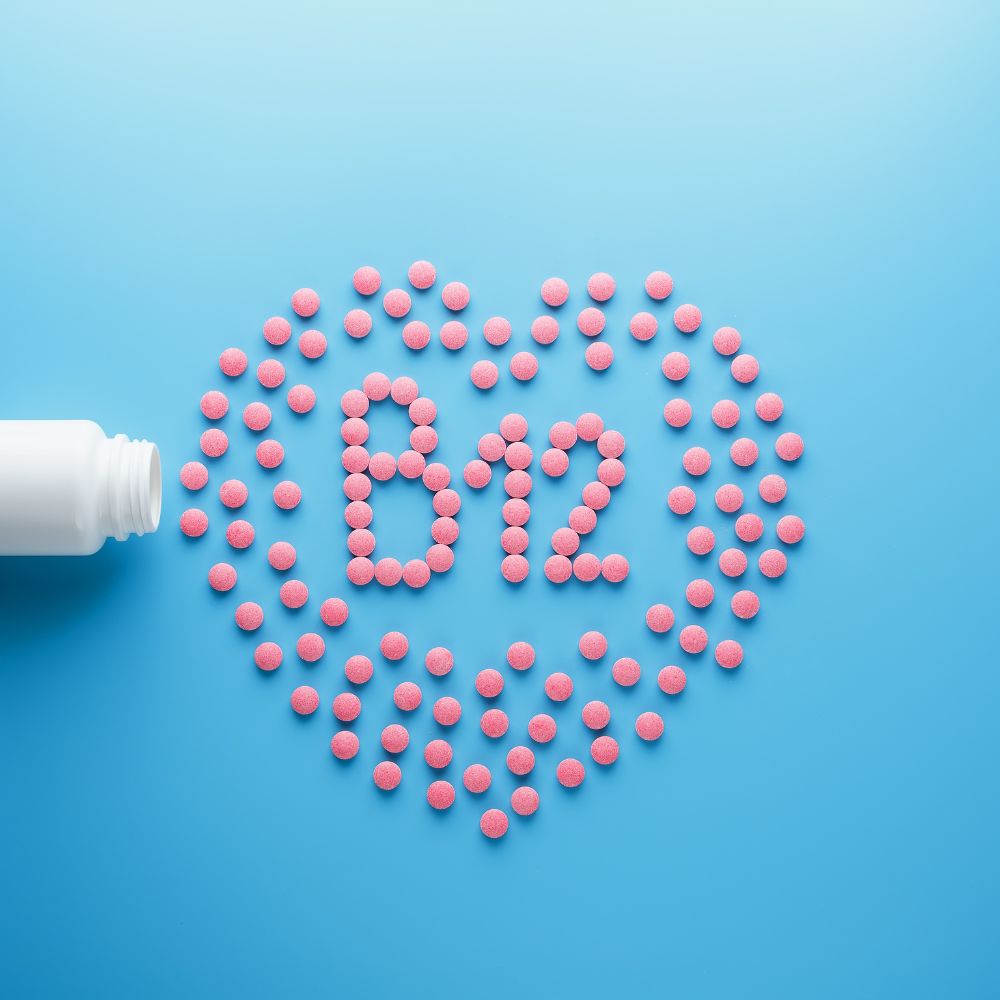A well-planned vegan diet can deliver all of the vital elements your body requires.. However, certain nutrients are more challenging to obtain from plant-based sources alone. Because of this, vegans might want to think about taking particular supplements to make sure they get the nutrients they need. Here are some key supplements that vegans might want to include in their daily routine.
1. Vitamin B12
Why It’s Important:
The synthesis of DNA, red blood cell formation, and neuron function all depend on vitamin B12. It’s primarily found in animal products, making supplementation vital for vegans.
Supplementation:
- Recommended Dose: 250-500 micrograms daily or 1000 micrograms weekly.
- Forms Available: Cyanocobalamin and methylcobalamin (the latter is more easily absorbed).
2. Vitamin D
Why It’s Important:
Vitamin D supports bone health, immune function, and overall mood. While sunlight exposure helps your body produce vitamin D, those in less sunny climates or with limited sun exposure may need a supplement.
Supplementation:
- Recommended Dose: 600-800 IU daily.
- Forms Available: Vitamin D2 (ergocalciferol) is vegan-friendly, while vitamin D3 (cholecalciferol) is often derived from animal sources. Look for vegan D3 sourced from lichen.
3. Omega-3 Fatty Acids
Why It’s Important:
Omega-3s are essential for heart health, brain function, and reducing inflammation. The primary omega-3 fatty acids, EPA and DHA, are mainly found in fish.
Supplementation:
- Recommended Dose: 250-500 mg of combined EPA and DHA daily.
- Sources: Algal oil is a plant-based source that provides both EPA and DHA.
4. Iron
Why It’s Important:
Iron is required for producing hemoglobin, which carries oxygen in the blood. While plant sources of iron exist, they are non-heme iron, which is less efficiently absorbed by the body compared to heme iron from animal sources.
Supplementation:
- Recommended Dose: 8 mg for adult men and 18 mg for adult women (higher during pregnancy).
- Forms Available: Ferrous sulfate, ferrous gluconate, or chelated iron can be beneficial. It’s best taken with vitamin C to enhance absorption.
5. Calcium
Why It’s Important:
Calcium is essential for bone health, muscle function, and nerve transmission. While many plant foods contain calcium, some people may not consume enough to meet their needs.
Supplementation:
- Recommended Dose: 1000 mg for most adults.
- Sources: Look for calcium citrate or calcium carbonate that is fortified with vitamin D for better absorption.
6. Zinc
Why It’s Important:
Zinc is vital for immunological function, protein synthesis, and wound healing. Like iron, zinc from plant sources is less bioavailable than that from animal sources.
Supplementation:
- Recommended Dose: 8 mg for women and 11 mg for men.
- Forms Available: Zinc gluconate or zinc citrate are good options.
7. Protein Powder
Why It’s Important:
While many vegans get enough protein from whole food sources, those who are very active or looking to build muscle may benefit from additional protein.
Supplementation:
- Recommended Use: Depends on individual protein needs, generally 20-30 grams per serving.
- Sources: Look for plant-based protein powders made from peas, brown rice, or hemp.
8. Iodine
Why It’s Important:
Iodine is essential for thyroid function and metabolism. It is found in fish and dairy products, making it a concern for those on a vegan diet.
Supplementation:
- Recommended Dose: 150 mcg daily.
- Sources: Look for iodine derived from seaweed or potassium iodide.
Summary of Key Supplements for a Healthy Vegan Diet
| Nutrient | Why It’s Important | Recommended Dose | Vegan-Friendly Sources |
|---|---|---|---|
| Vitamin B12 | Supports nerve health, red blood cells, DNA synthesis | 250–500 mcg daily or 1000 mcg weekly | Cyanocobalamin, methylcobalamin |
| Vitamin D | Aids bone health, immune function, mood | 600–800 IU daily | Vitamin D2, vegan D3 from lichen |
| Omega-3 (EPA/DHA) | Supports brain, heart, and reduces inflammation | 250–500 mg combined daily | Algal oil |
| Iron | Essential for oxygen transport in blood | 8 mg (men), 18 mg (women) | Ferrous sulfate, gluconate, with vitamin C |
| Calcium | Necessary for bone, muscle, and nerve function | 1000 mg daily | Calcium citrate/carbonate with vitamin D |
| Zinc | Supports immunity, wound healing, and protein synthesis | 8 mg (women), 11 mg (men) | Zinc gluconate, zinc citrate |
Conclusion
While a well-planned vegan diet can provide most of the necessary nutrients, certain supplements can help fill in the gaps. Vitamin B12, vitamin D, omega-3 fatty acids, iron, calcium, zinc, protein powder, and iodine are important considerations for vegans looking to maintain optimal health. Before starting any new supplements, it’s wise to consult with a healthcare provider or registered dietitian to tailor your supplementation to your specific needs. With the right approach, a vegan diet can be both nutritious and fulfilling!
Frequently Asked Questions (FAQ)
Even with a well-planned vegan diet, certain nutrients like B12, vitamin D, and omega-3s are difficult to get from food alone. Supplements can improve long-term health by bridging these gaps.
Since vitamin B12 isn’t naturally present in plant foods, it’s thought to be the most important. A deficiency can lead to serious neurological issues over time.
Yes, but it depends on your location, skin tone, and sun exposure. Many people—vegan or not—still need vitamin D supplements, especially in winter or cloudy regions.
Generally, yes, but it’s best to consult a healthcare provider to ensure proper dosing and avoid potential interactions, especially with iron or zinc.
Not necessarily. Always check labels—some supplements contain animal-derived ingredients like gelatin or non-vegan D3. Look for products labeled vegan-certified.

